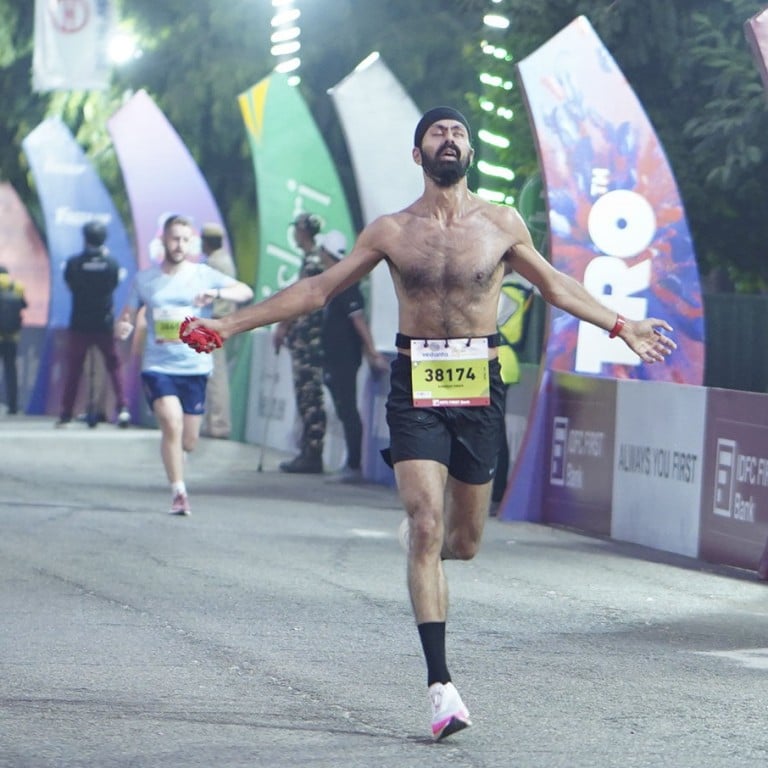
How distance running transformed an Indian executive, from 22kg weight loss to 100 half-marathons in 100 days challenge to highlight air pollution
- New Delhi resident Sundeep Singh thought he would take up distance running, but could not go even 1km. Then he trained for a half-marathon, and has now run 300
- With pent-up energy after a Covid-19 lockdown, he set out on a whim for a 100km overnight run around his local area, proving his physical and mental strength
For many of us, a Friday night out entails a meal at a restaurant, watching a movie or relaxing with friends and family. Sundeep Singh spends many of his evenings hitting the pavement.
As the native of New Delhi, India, wrapped up his work one Friday evening in August 2020, he set off on an impromptu run. Half an hour in, he made up his mind to do a 100km (62-mile) ultramarathon through the night.
Over the past decade, the diehard runner has completed 25 marathons and 300 half- marathons, setting a personal best time of 3 hours and 9 minutes in the marathon and 1 hour and 25 minutes in the half last year.
He accomplished a unique feat in 2019, running 100 half-marathons in 100 days without a break to highlight India’s poor air quality. He chronicled this, and his running journey, on his blog, running-sundeep.blogspot.com.
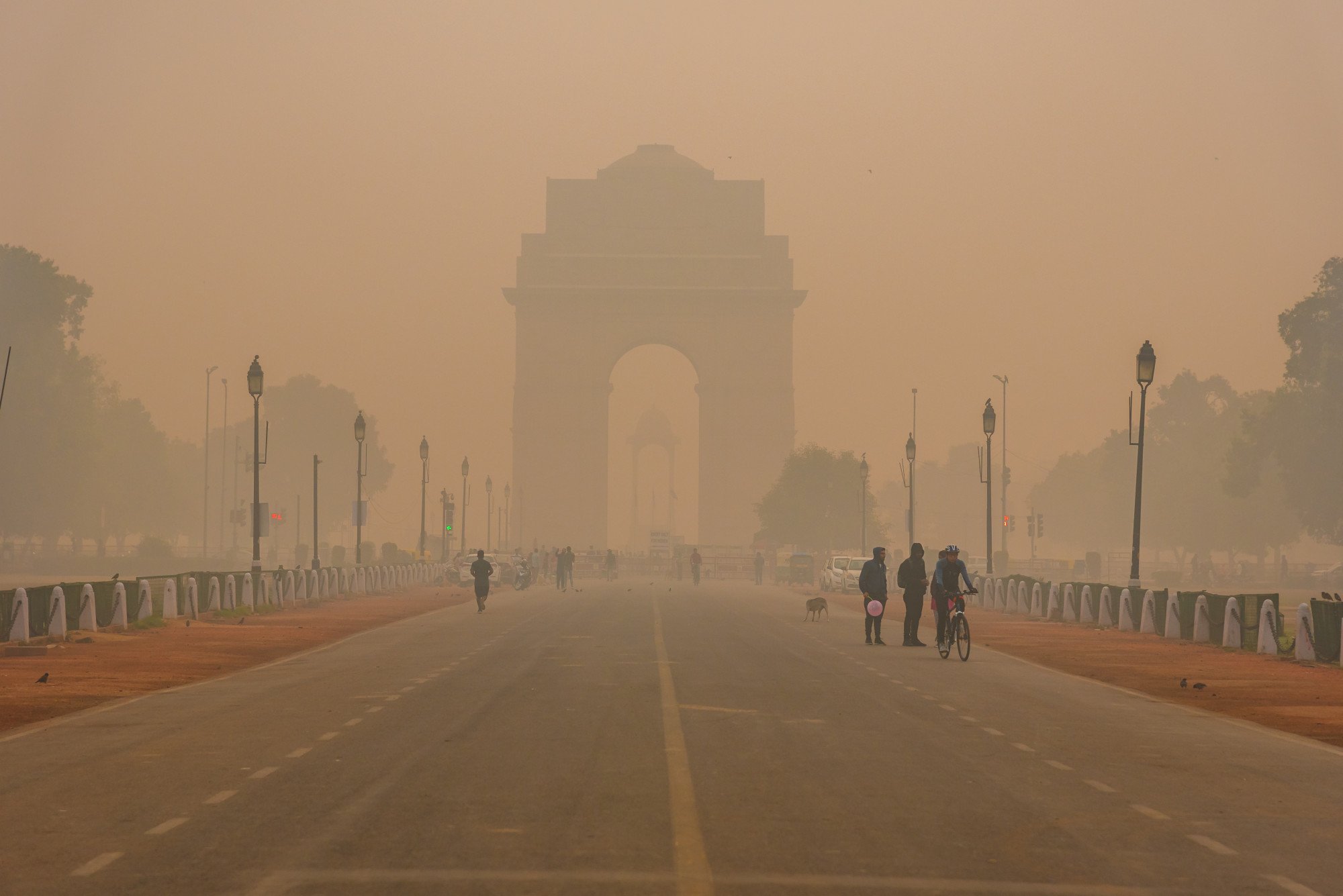
“I had not run outdoors for three months,” says the 40-year-old, who started at 8pm with a loop around his house.
He’s marathon world record holder Eliud Kipchoge’s ‘hero’: meet Bottle Claus
“After the first 25km I took a short break, refuelled and slipped into a fresh pair of socks and shoes,” he says. By 1.45am, he had done 50km.
“The late-night walkers had disappeared, and the roads were eerily silent. The toughest part was to distract the mind,” says Singh.
He recalled a saying: “Running is nothing more than a series of arguments between the part of your brain that wants to stop and the part that wants to keep going.”
Singh’s wife, Japneet, knew he was onto something when he didn’t return from the run until midnight.
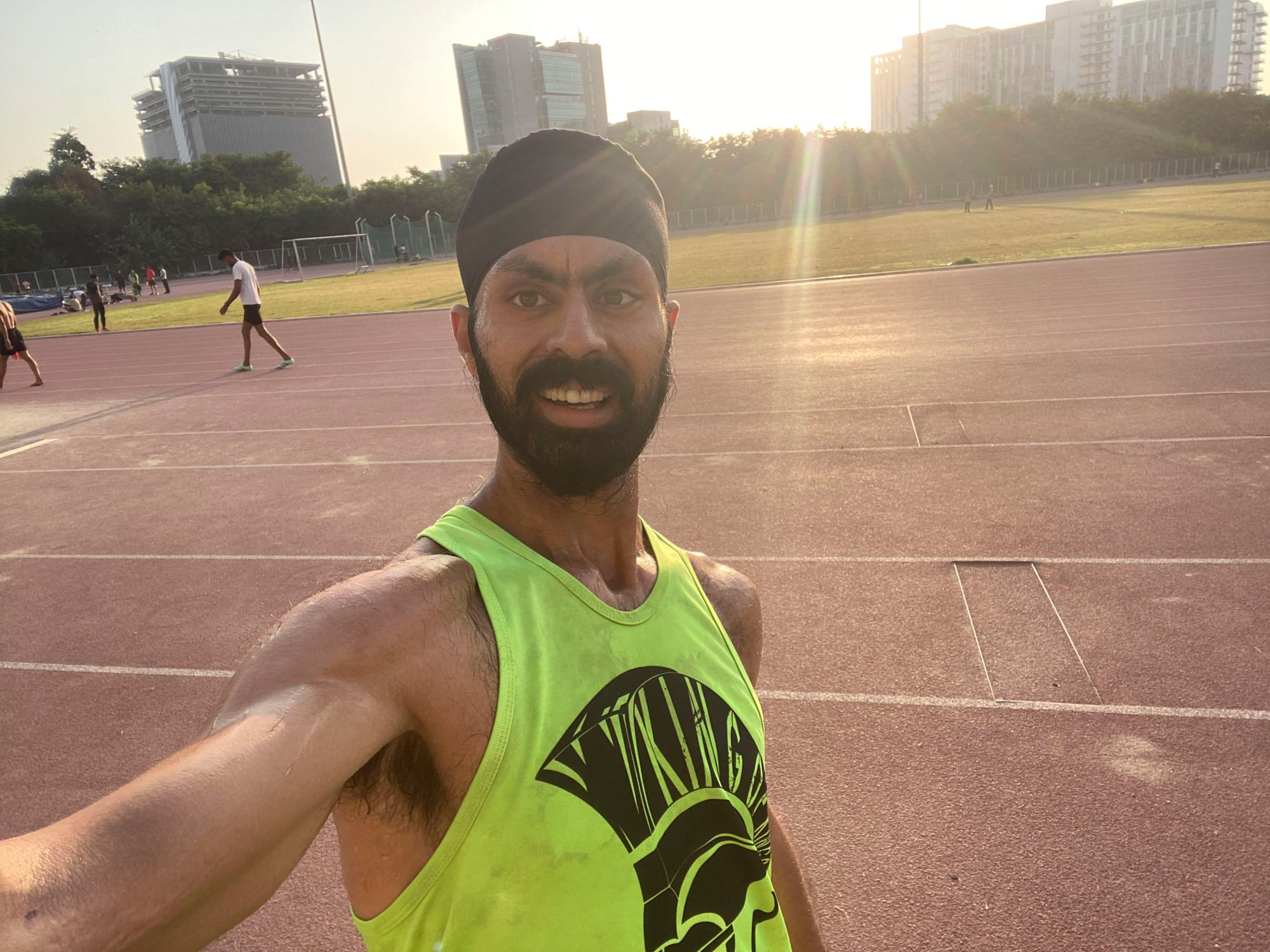
“It turned out to be an unplanned night out for me as well,” she says, as she went to their flat balcony every hour to see if he needed anything to continue the run.
“At 5am, the darkness began to fade, and the early morning walkers started appearing. After 85km, the body was fatigued,” says Singh, but adds that, with just 15km left, “there was no way I was stopping”.
He finished at 8am – 12 hours after he started.
How to age well: 93-year-old marathoner’s 10 tips for a fit and active life
The managing director of a global consulting firm, Singh became interested in running in 2014 while interviewing a candidate for a position at his work, who mentioned that he ran long distance.
“I was intrigued and went for a run that evening – and could barely finish a kilometre,” says Singh. That inspired him to train.
He signed up for the Delhi Airtel half-marathon, scheduled for the end of that year, and started running outdoors, focused on building distance. Months later, he did a practice run, finishing the 21km in 2 hours 20 minutes.
“While I was able to complete the distance, I realised that I needed to lose weight,” he says. Over the following two years, he shed 22 of his 93 kilograms and has maintained a weight of 71kg since then.
How does he do it? Retiree nears 200 marathons in 13 years
A dietitian advised him to eliminate carbonated drinks, fried food and sugar from his diet. He stops eating carbohydrates at 6.30pm. Breakfast – muesli, three eggs and a peanut butter sandwich – is his heaviest meal of the day.
For lunch and dinner he has chapattis – Indian flatbreads – with vegetables and dal, a stew made of pulses such as lentils. He snacks on fruit, steamed rice cakes known as idli, and porridge, known as upma.
He started working with strength training coach Anubhav Rai, who runs local gym Bomiso.
Be a faster and happier runner with yoga and a veggie alkaline diet
He began wearing 2kg ankle weights into the office to strengthen his legs.
He also took up yoga and trained to become a certified running coach simply to become a better runner.
Singh ran his first half-marathon in November 2014, finishing in 1 hour 43 minutes 7 seconds and cutting 37 minutes from his practice time, and completed his first marathon – the Standard Chartered Mumbai – in January 2015, finishing in 4 hours 14 minutes 27 seconds.
Singh runs 70km a week outdoors over five days, putting in runs of 20km, 18km, 14km and 10km, and an 8km recovery run. That last one is at a leisurely pace with his team while having a meeting in motion. He almost always wears running gear, even at work.
He posted an update on his runs on social media each week, along with some best practices to reduce air pollution.
By half-marathon number 60, with swollen feet and tight hamstrings, he resorted to running in slippers for a few days.
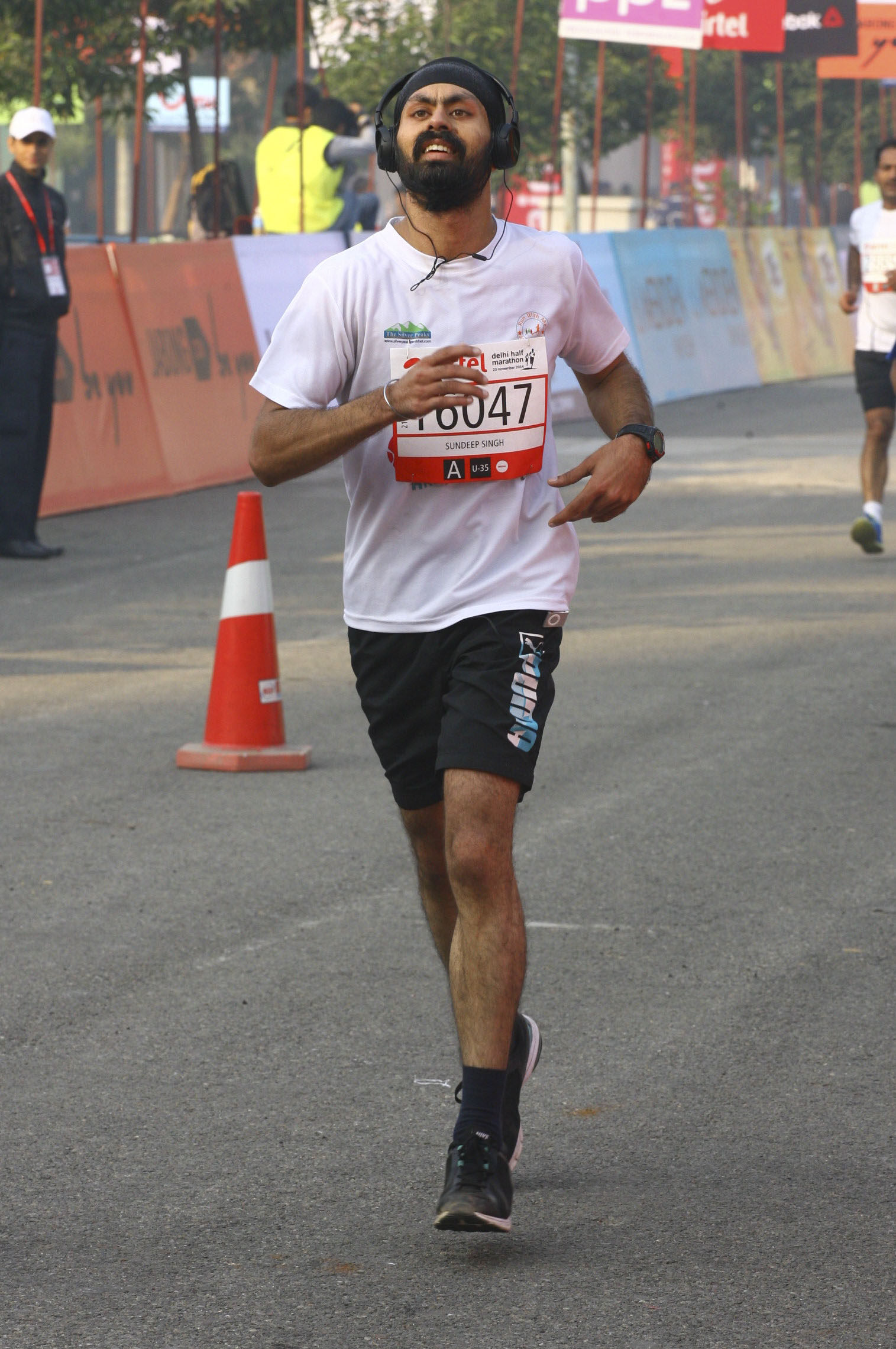
With each run he felt more depleted and even considered quitting – but realised the mental discomfort from that would be far worse than the physical discomfort of completing the challenge he had set himself.
To get to 100, he needed to get as much rest as he could – so he slept at every opportunity, including at his son Ekam’s chess tournaments and while waiting for him at school, at airports, “and even at the dentist’s clinic”.
His 100 runs in 100 days drew media attention and put India’s air-quality crisis in the spotlight, “but the magnitude of change needed is so enormous that a lot more needs to be done”, he says.
Ekam often says, ‘My Dad can do anything’. He has watched me wake up early, say no to tempting food, lace up after a long day at work, and improve as a runner.
Running has transformed his lifestyle, from his eating habits to his sleep cycle. It has made him appreciate the small things in life and taught him to use his time efficiently.
“Running brings you closer to your best version and this is what motivates me to keep running,” he says.
His clients look at him differently now, he says. “The level of trust they exude in my abilities has increased significantly.”
She started strength training at 88, proving you’re never too old for health
Running has brought his family closer, too.
His wife, herself a partner in a global consulting firm, says: “I am in awe of Sundeep’s commitment to running, his mental strength, and humility. All through running 100 half-marathons, he made time for the family, played chess with our son, went for movies and even did grocery shopping.”
“Ekam often says, ‘My Dad can do anything’,” Singh says of his 13-year-old son. “He has watched me wake up early, say no to tempting food, lace up after a long day at work, and improve as a runner.
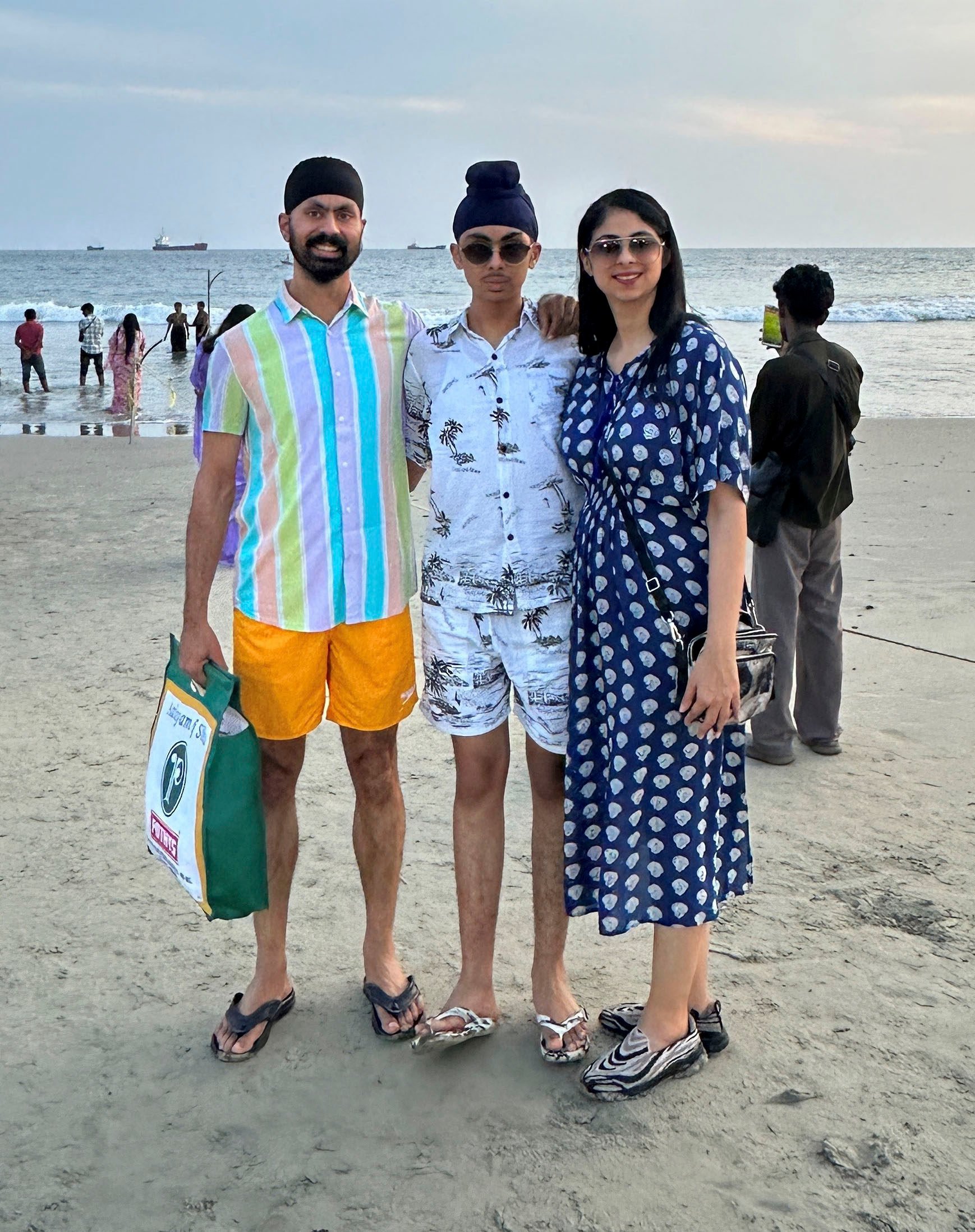
“When we are on vacation, he makes sure that any plans are made around my running schedule. He is imbued with the sportsmanship spirit in the way he trains for his own sport, chess.”
Having gained a sense of purpose and direction in his life through running, Singh has his sights set on running the 2024 Boston Marathon in the United States. He qualified for the race in 2023, but a projected 500-day wait to secure a visa after the Covid-19 pandemic prevented him from joining.
As his clients say, no challenge is too big for a man who can run 100 half-marathons in 100 days.

